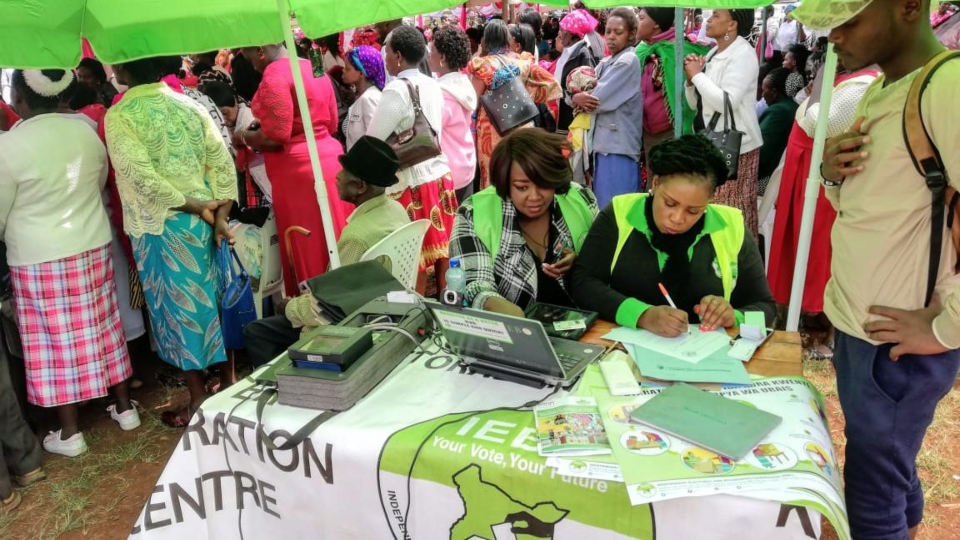IEBC Launches Nationwide Voter Registration Drive Targeting 6.3 Million New Voters for 2027 Election
The Independent Electoral and Boundaries Commission (IEBC) has kicked off a nationwide mass voter registration drive on Monday, September 29, 2025, aiming to enroll approximately 6.3 million new voters, with a focus on young Kenyans, ahead of the 2027 General Election. The initiative seeks to expand the current voter register, which stands at 22.1 million, to ensure broader participation in the upcoming polls.
IEBC Chairperson Erastus Ethekon announced that the target of 6.3 million new voters is based on data from the National Registration Bureau, focusing on Kenyans who will be 18 or older by the time of the exercise. Unlike previous drives that relied on census data, this approach leverages more precise records to identify eligible voters. The registration campaign will span all 290 constituencies, starting with a launch in Kajiado. Voter registration stations and all Huduma Centres will operate Monday to Friday, from 8 am to 5 pm, offering services such as new voter registration, updates to voter details, registration transfers, and online voter information verification.
The IEBC has allocated significant resources to support this initiative. Out of the Sh57.3 billion budgeted for the 2027 elections, Sh8 billion is dedicated to continuous voter registration, while Sh2.5 billion will fund stakeholder engagement efforts. Additionally, Sh7 billion is set aside for replacing ageing Kenya Integrated Election Management System (KIEMS) kits, with Sh2.4 billion allocated for system maintenance to ensure smooth operations during the election period.
The registration drive has sparked widespread interest among political leaders and analysts, who view the youth, particularly Generation Z, as a pivotal force in shaping the 2027 election outcome. Opposition leaders have actively encouraged young Kenyans to participate. At a recent National Delegates Conference hosted by PLP leader Martha Karua, DAP-K leader Eugene Wamalwa emphasized the importance of voter registration, stating that obtaining IDs and registering to vote is critical for driving political change. Former Deputy President Rigathi Gachagua echoed this sentiment, urging young people to move beyond social media activism and use their votes to effect transformation at the ballot box. Former Vice President Kalonzo Musyoka also called on youths to secure IDs and register, reinforcing the message of civic engagement.
Political analysts highlight the potential for a generational shift in Kenya’s electoral landscape. Prof Tom Nyamache of Turkana University noted that the 2027 election could mark a departure from traditional tribal voting patterns, with the youth vote potentially becoming a decisive factor. A significant turnout from Generation Z could reshape the country’s political future, analysts suggest.
Despite the enthusiasm, the IEBC has faced scrutiny from the Opposition regarding its preparedness, particularly in procurement processes involving technology providers like Smartmatic. In response, Chairperson Ethekon assured the public that the commission has addressed key concerns, including strengthening data protection measures and developing clear operational policies.
Historical data underscores the importance of youth participation. A post-election review from August 2022 revealed that eight million youths were registered for the last election, representing 40 percent of the total voter roll. However, voter turnout was low, with only 14.3 million of the 22.1 million registered voters casting ballots. This apathy was a significant factor in President William Ruto’s narrow victory by about 200,000 votes over former Prime Minister Raila Odinga.
To be eligible for registration, voters must be Kenyan citizens aged 18 or older, possess a valid national ID or passport, and not be previously registered. Those convicted of election-related offences within the past five years or declared of unsound mind are ineligible. For Kenyans in the diaspora, only passports will be accepted for registration, except for those in East Africa, who may use national IDs.
The IEBC’s mass voter registration drive represents a critical step toward ensuring a robust and inclusive electoral process in 2027, with the youth poised to play a transformative role in Kenya’s democratic future.


